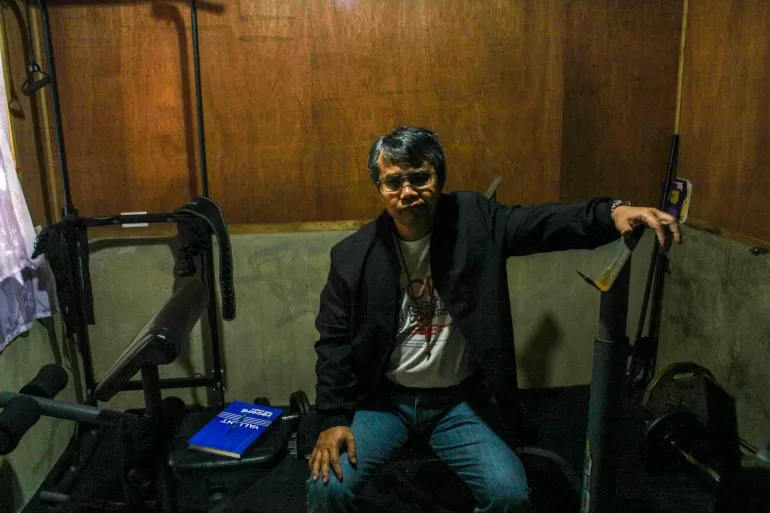A well-known activist leader in the mountainous Cordillera region in the northern Philippines, the 49-year-old spends most of his days between several undisclosed refuges.
Bolinget tries to stay invisible indoors, not leaving unless absolutely necessary and avoiding making any noise that might draw attention.
“I have normal routines with some extraordinary effort,” he said.
On the rare occasions that he spends with his family in their own home, he follows the same protocol.
At night, whether Bolinget is there or not, his wife and four children wake up whenever any of their six dogs bark. They monitor security cameras and step into the street, worried that armed men might have come for him. Nearby households do the same, knowing that the man they’ve called a friend for decades has been branded a “terrorist” by the Philippine government, which wants him behind bars.
“We need to be able to smell danger, have the emergency contacts at the ready, and be able to tell if we’re being tailed in a public place,” he said.
Bolinget is chairperson of the Cordillera Peoples Alliance (CPA), an activist coalition of Indigenous people’s groups. He and three other CPA leaders Jennifer Awingan-Taggaoa, Steve Tauli, and Sarah Abellon-Alikes were designated “terrorists” by the Anti-Terrorism Council (ATC) on July 10, 2023.
Citing “probable cause” of engagement in “organised violence,” the ATC, led by executive officials, claims the CPA and the four individuals are part of the country’s long-running Communist armed rebellion.
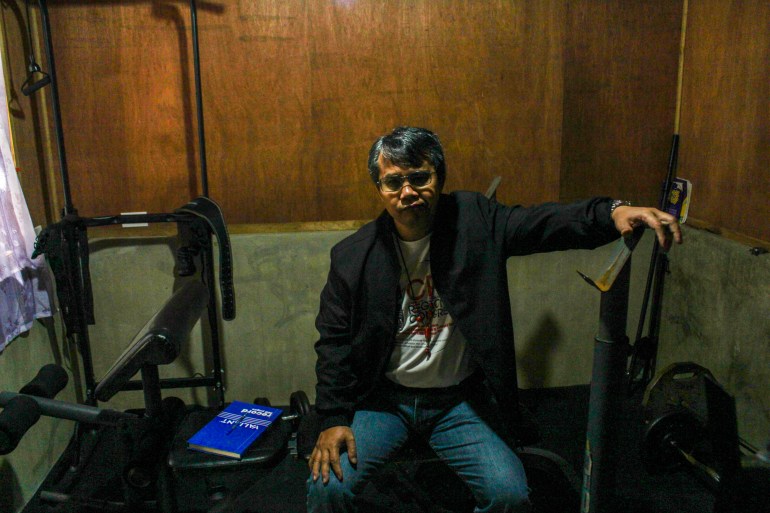
Under the Anti-Terrorism Law (ATL) of 2020, the authorities can arrest people identified as “terrorists” without a warrant, restrict travel, freeze assets, conduct surveillance and issue new court decisions to restrict their movements without explaining why. Some individuals who have previously been labelled “terrorists”, communists or enemies of the state have later been found dead. Some 89 extrajudicial killings of activists have taken place since June 2022 when Ferdinand Marcos Jr became president.
According to the human rights group Karapatan, 51 people are currently designated as “terrorists”.
The designation marks a step up from the more common red-tagging, where activists are linked to the armed rebellion in a bid to justify a crackdown. In the past, all four CPA leaders have been slapped with cases relating to their alleged involvement with rebels. All of which, including a “shoot to kill” order on Bolinget, have been dismissed in court.
Critics have described the ATL as the second coming of martial law in the Philippines.
For the last nine months, the CPA leaders have lived in relative seclusion apart from court hearings to contest the ATC decision.
“We want to prove the facts and question the basis of the designation,” said Baguio City Councilor Jose Molintas, lawyer to the four alleged “terrorists”.
Karapatan’s Cristina Palabay said the law “institutionalises the ATC’s mandate to act as judge and jury in implementing its draconian crackdown. It not only threatens and harasses activists, but also puts their lives at risk.”
Life in terror
On social media, the Bolinget and Taggaoa families were branded terrorists as early as 2020.
Pictures of their children, some of whom are under the age of 18, have been paraded as the offspring of “terrorists” by trolls and even law enforcement personnel. Taggaoa’s daughter Kara, a labour rights activist in Manila, was also arrested in 2022 over a robbery that allegedly took place during a demonstration.
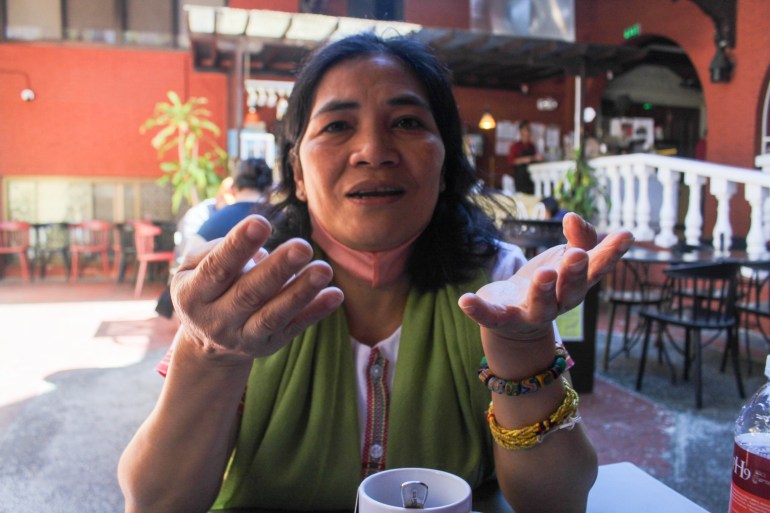
Joel Egco, spokesperson for the National Task Force to End the Local Communist Armed Conflict, issued a warning to dissenters earlier this year: “Before we charge you (with terrorism), surrender now!”
In such an atmosphere, the CPA leaders live in constant fear for their family’s safety. Bolinget says some friends and relatives have cut ties, fearful that associating with them could be considered criminal.
“I’m an enemy of the state, an open target. The state wants to isolate me from the family, it’s easier for them that way,” he said.
Bolinget led one of the 37 Supreme Court petitions against the ATL back in 2020, flagging potential human rights abuses.
“All our fears came true and I have become a living testament that to be deemed a terrorist is to be treated worse than a criminal,” he said.
The designation is also affecting their health. Bolinget and Taggaoa have been experiencing more frequent stomach trouble and must convince their doctors to see them at inconvenient times.
Taggaoa feels “so sickly all the time. The doctors said it’s stress-induced.”
Bolinget blames the lack of sleep for his poor health. “One-half of your brain is always awake and alert. I’m always on edge, like my temper is going to boil any minute,” he said.
Constant alarm
When Taggaoa was arrested in January 2023, she was not worried. She, Bolinget and five others had been charged with rebellion after allegedly joining an armed raid.
“I knew right away it was fake and I could prove this in court,” she told Al Jazeera. The case was dropped that May. But a couple of months later, she discovered she had been designated by the ATC when the decision was published in a national newspaper.
Taggaoa spent the next four months hopping between safehouses and reminding her family back home to lock all doors and stay vigilant.
In January, Marcos Jr said he wanted the Philippines‘ swift exit from the “grey list” of the Financial Action Task Force (FATF), a global watchdog for money laundering and terrorist financing.
To do this, Marcos announced accelerated “action plans to combat money laundering and counterterrorist financing, and to file cases against violators”.
Living without access to personal and business funds has been a particular challenge as Taggaoa had to let go of her small general store.
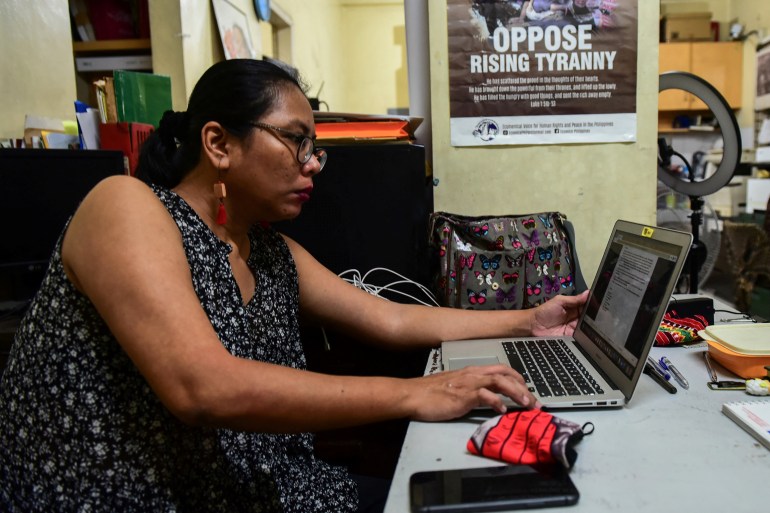
The accounts of Taggaoa’s husband, a university professor, were also frozen so he was unable to meet the loan payments on his car and had to make special arrangements to receive his salary.
Taggaoa believes the designation is a new tactic, designed to neutralise opponents after other methods have failed.
“They harass you and press you to side with the government. And if you refuse, eventually they’ll be calling you a terrorist,” Taggaoa said.
Throughout 2022, military officers tried to persuade Taggaoa and her relatives to “cooperate” with them.
Coming home from school, her teenage nephew was even accosted by soldiers who, she says, pressured him into stealing Taggaoa’s files and flash drives.
Courtroom confusion
Legal challenges have also proved difficult.
When the four appealed directly to the ATC for the designation to be removed in August 2023, it was immediately denied without a hearing.
“The ATC just relies on unverified intelligence reports. It merely accepts these as true and issues designations immediately, which is a violation of due process,” said Molintas, legal counsel to the four. As he was speaking to Al Jazeera, posters of him were being put up on city streets labelling him a “terrorist”, too.
Department of Justice spokesperson, lawyer Mico Clavano, defended the designation process, saying the ATL allows for it as a purely “executive act” without judicial involvement.
Therein lies the danger, according to Molintas.
“A person is supposed to be presumed innocent, not guilty, before his day in court,” he said. “A terrorism charge is different from ordinary red-tagging because it strips one of the right to due process.”
After the appeal was denied, Molintas shifted his attention by November 2023 to nullifying the ATL and the designation at the Regional Trial Court (RTC). Since then, the lawyer accused the government of trying to derail their efforts at each turn.
At three of the RTC hearings, armed men dressed in civilian clothing were seen inside the court. They were later identified as soldiers on active duty.
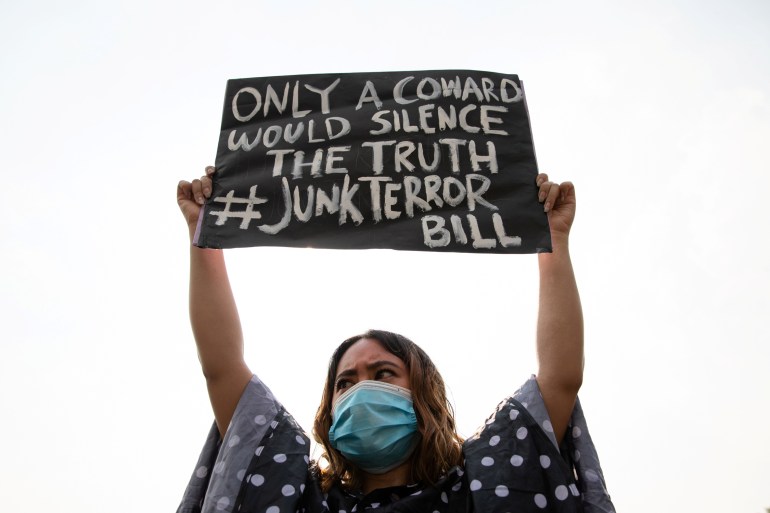
The Office of the Solicitor General (OSG), argues that even if the court rules in favour of the four, they would still be considered “terrorists” outside Cordillera because the RTC presides “in only one part of the country”.
Some lawyers disagree.
“The OSG is wrong,” said Ephraim Cortez from the National Union of Peoples’ Lawyers. He asserts that the challenge at the RTC applies nationwide because it invokes constitutional powers to determine “grave abuse” in government decisions.
The RTC has set a further round of hearings on April 25.
Meanwhile, Taggaoa rarely leaves the house unless absolutely necessary. Her community research as well as her role as a parent have been severely compromised, and she dreads the same fate for her children.
“I think my life will be like this until our case is resolved,” she said, but while the “terrorist tag” has taken a toll on her family, there has been an unexpected benefit.
“We protect each other and it’s brought us closer together,” she said.
